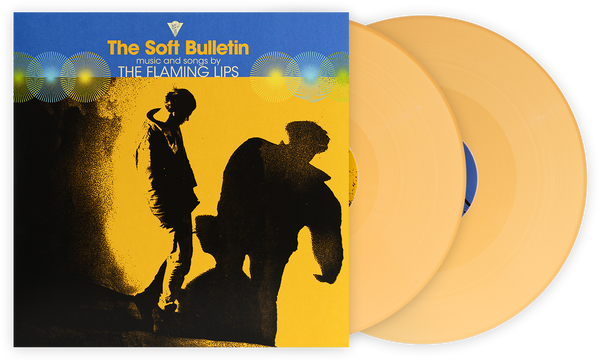The Flaming Lips’ Wayne Coyne is known as psychedelic rock’s mad scientist and merry prankster, releasing 24-hour songs encased in a human skull and traversing adoring crowds in a plastic bubble. It’s hard to imagine today, but before the confetti cannons and bunny suits, Coyne worked menial jobs in Oklahoma City — unloading trucks, installing office equipment, and frying fish and chips at a Long John Silver’s.
One day behind the deep frier, two “pissed off” guys stormed into the restaurant and pointed “the biggest gun I’ve ever seen in my life” at a 17-year-old Coyne. “Obviously, they robbed us and left and didn’t kill me,” Coyne told Blank on Blank in 2002. “I remember the elation. We couldn’t stop crying and laughing and jumping up and down. We were celebrating, like we had just won a million dollars.”
Celebration in the face of death seems to sum up The Flaming Lips, from their rascally, noisy 1986 debut Hear It Is to this year’s tranquil King’s Mouth. The gimmicks, costumes, and pranks wouldn’t mean much without a counterweight of harsh reality: 1999’s The Soft Bulletin was inspired by the death of Coyne’s father and guitarist Steven Drozd’s heroin addiction, and 2013’s The Terror was an unflinching exploration of depression and fear.
But spin nearly any record or catch their surreal, communal live show, and it’s clear: The Flaming Lips acknowledge darkness and opt to throw a lovefest in spite of it. Most fans will point you directly to The Soft Bulletin as their masterpiece — and it’s Vinyl Me, Please’s Essentials Record of the Month this month — but their story doesn’t begin or end there. If you’d rather take a detour through their discography, here are eight other essential Lips albums.
In a Priest Driven Ambulance (1990)
Sounding somewhere between Spacemen 3 and the Jesus and Mary Chain, The Flaming Lips’ first very good album is an inquiry into Coyne’s fascination with religious faith. “I wish I did believe in God,” he told The Telegraph in 2006. “It would be a great relief to think, ‘God'll take care of it. God'll put gas in the car tomorrow.’” On screwy modern hymns like “Shine On Sweet Jesus” and “God Walks Among Us Now,” In a Priest Driven Ambulance probes the psychedelia under the surface of the Bible (“How does it feel to be breakin’ apart / Breakin’ down molecules?” he asks the Grand Designer in the latter song) and ends with an off-kilter rendition of Louis Armstrong’s “(What a) Wonderful World.”
Hit to Death in the Future Head (1992)
The Lips’ major label debut on Warner Bros. doesn’t have a central theme like In A Priest Driven Ambulance, but it serves as a bridge from their noisy beginnings to their sunshine-pop future. Coyne’s knack for a melody is showing more than ever: “Hit Me Like You Did the First Time,” “Felt Good to Burn,” and “Frogs” resemble the most eccentric end of the Beach Boys, like 1967’s Smiley Smile. Hit to Death in the Future Head also plants the seeds for sound experiments like Zaireeka — check out the closer “Noise Loop,” a half hour of blaring static from speaker to speaker.
Transmissions from the Satellite Heart (1993)
The Flaming Lips’ sixth album marked the exit of guitarist Jonathan Donahue and drummer Nathan Roberts — and both roles replaced by crucial member Steven Drozd. (“He’s a master, master musician,” Coyne told Rolling Stone in 2018. “He could play with Miles Davis. He could play with Igor Stravinsky.”) The album won them their only mainstream hit: “She Don’t Use Jelly,” a sweet ode to idiosyncrasy that made it to Beverly Hills, 90210 and Beavis and Butt-Head. (“Uh oh, I think this is college music,” Beavis frets.) Yes, it was — and with fan favorites like “Turn it On,” “Oh My Pregnant Head,” and “Superhumans,” the Lips defined it.
Clouds Taste Metallic (1995)
Expectations were high for The Flaming Lips to deliver another “She Don’t Use Jelly,” to continue their MTV dominance with slackery-weirdo anthems. Instead, “Jelly” turned out to be a fluke — and instead of trying to churn out another hit, the Lips focused on crafting ambitious albums to critical applause. Clouds Taste Metallic is solid but low-key, lacking instantly recognizable Lips songs. But on its best tracks, like “Placebo Headwound,” “Psychiatric Exploration of the Fetus With Needles,” and “Christmas at the Zoo” (an inspired rip of Thunderclap Neuman’s “Something in the Air”), they flex their songwriting and studio mastery and warm up for The Soft Bulletin’s knockout punch.
You can buy a Vinyl Me, Please exclusive edition of this album right here.
Zaireeka (1997)
While the Lips crafted the classic song cycle The Soft Bulletin, they simultaneously made the left-field Zaireeka, a deconstructed work meant to be played on four stereos simultaneously. In the midst of their songwriting evolution, Zaireeka was a bit of an outlier that foreshadowed their future of zany experiments — but what could have been a gimmick ended up being to a greater artistic end. “I think the experiment really pushed us into making emotional music that was effective,” Coyne told the Recording Academy in 2019. They needed one more nudge to the psychological cliff’s edge of The Soft Bulletin, and Zaireeka was it.
Yoshimi Battles the Pink Robots (2002)
The Lips’ most accessible and easy-to-like album, Yoshimi Battles the Pink Robots follows a karate-chopping title character (inspired and voiced by the Boredoms’ drummer Yoshimi P-We) as she fights “evil machines” — for all of two songs. Like Sgt. Pepper’s before it, Yoshimi is a concept album in the loosest sense of the term, using a vague framing device to unify open-ended songs about nostalgia, longing and coming of age. “Fight Test” nicks the melody of Cat Stevens’ “Father and Son” and lands at a better song, “Ego Tripping at the Gates of Hell” makes disappointment sound blissful, and “Do You Realize??” is an open-hearted acceptance of mortality and impermanence. Forget the pink robots; Yoshimi is deeply human.
At War with the Mystics (2006)
The underrated follow-up to Yoshimi Battles the Pink Robots is more sober and pointed, full of philosophical grey areas and moral imperatives. “The Yeah Yeah Yeah Song” asks to what end we would use unlimited power and privilege (“It's a very dangerous thing to do exactly what you want,” Coyne sings), “Free Radicals” is a Dubya-era plea to a suicide bomber, and “The W.A.N.D.” is a fuzz-rock ripper that updates John Lennon’s “Power to the People” (“We’ve got the power now, motherfuckers!”) for the modern era. But At War with the Mystics isn’t all polemics: ballads like “The Sound of Failure,” “Vein of Stars,” and “Mr. Ambulance Driver” find the Lips at their most restrained, autumnal, and lovely.
You can buy a Vinyl Me, Please exclusive edition of this album right here.
Embryonic (2009)
If The Flaming Lips have mostly stayed busy in the 2010s with low-key collaborations like 2012’s Heady Fwends (with Bon Iver, Neon Indian, Yoko Ono, and more) and 2019’s King’s Mouth (with the Clash’s Mick Jones), 2009’s Embryonic works as a satisfying conclusion to the band’s first two acts. Featuring guest stars like MGMT (“Worm Mountain”) and Karen O (“Gemini Syringes,” “I Can Be a Frog,” “Watching the Planets”), Embryonic is an overview of the Lips’ various styles, shot through with unnerving, motorik-like repetition. While discussing the album’s influences with Billboard, Coyne cited Miles Davis’s heaving, churning 1970s albums with John McLaughlin, like On the Corner, which makes perfect sense: Embryonic seems to throw every mood of The Flaming Lips — terror, curiosity, paranoia, and the rest — into the same spin cycle.
Morgan Enos is a music journalist specializing in classic rock, with bylines in Billboard, TIDAL, The Recording Academy, Discogs, Vinyl Me, Please, and more. He lives in Hackensack, New Jersey and can be found at his website.
Related Articles
Join the Club!
Join Now, Starting at $44Exclusive 15% Off for Teachers, Students, Military members, Healthcare professionals & First Responders - Get Verified!






